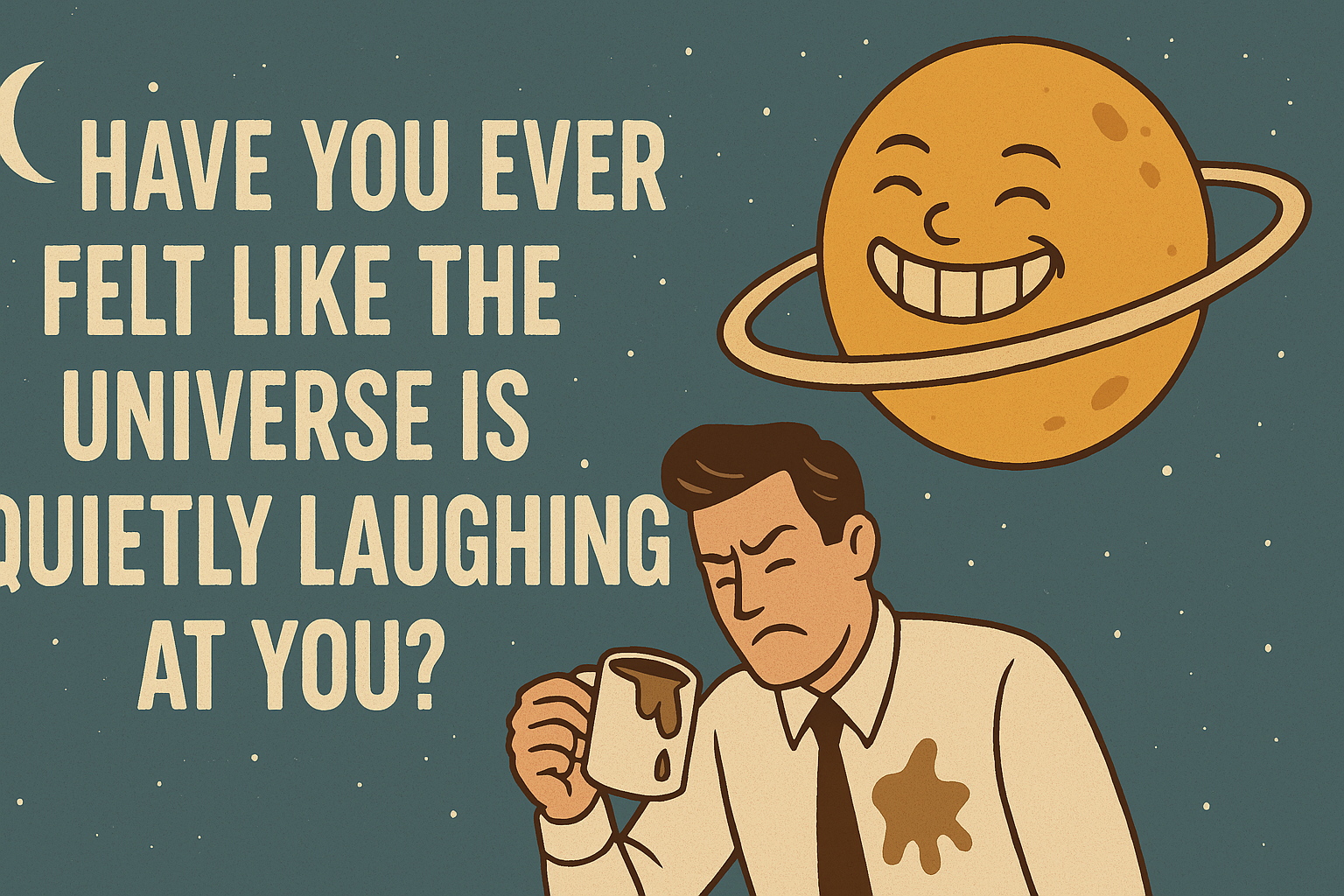Have you ever felt like the universe is quietly laughing at you? You spill coffee right before a meeting, your internet dies the moment you need to click “submit,” and somehow, your phone always falls face down. Maybe it’s not just bad luck. Maybe it’s the strange poetry of universal principles — the invisible rules that shape how life unfolds. Scientists, philosophers, and engineers have tried to name them. The rest of us? We just live them.
Murphy’s Law —
“Anything that can go wrong, will go wrong.”
It was born not out of cynicism but out of frustration in a 1949 Air Force experiment, when engineer Edward A. Murphy Jr. discovered that every possible mistake with the wiring of
acceleration sensors had indeed been made. His phrase spread through the aerospace world, then into popular culture. But the truth behind it isn’t that the universe is
malicious — it’s that systems are
fragile and humans are
fallible. A rocket has thousands of connections; a single
overlooked detail can destroy it. The same goes for life: your careful morning routine can fall apart because you forgot your keys. The point of Murphy’s Law isn’t despair — it’s
humility. When you accept that things
will go wrong, you start to prepare better, plan calmer, and maybe even laugh when the coffee spills. As one NASA engineer once said, “We don’t fight Murphy; we work with him.”
The Pareto Principle, or the 80/20 rule, came from something oddly mundane — garden peas. In 1906, Italian economist Vilfredo Pareto noticed that 20 percent of the pea pods in his garden produced 80 percent of the peas, and later saw the same pattern in wealth distribution. Since then, data scientists have found the 80/20 split almost everywhere: 20 percent of customers bring in 80 percent of
revenue; 20 percent of crimes are
committed by 80 percent of offenders. Psychologists argue this
pattern reveals something essential about how complex systems balance efficiency and chaos. For me, it’s also a life compass: not all effort matters equally. Most of what fills our days is noise, but a small portion — those deep conversations, those creative bursts — creates most of our fulfillment. The art of living might simply be identifying which 20 percent of your actions give you 80 percent of your joy.
Hanlon’s Razor says:
“Never attribute to malice that which can be explained by stupidity.” It first appeared in a 1980 book by Robert J. Hanlon, but versions of it trace back to German philosopher Goethe. The rule may sound cynical, yet it’s one of the kindest. Cognitive science supports it: our brains are prone to the
intentionality bias — we assume others act
deliberately even when their behavior is random or careless. So we waste emotional energy imagining enemies where there are only humans having bad days. The email wasn’t ignored to hurt you; it was buried. The driver didn’t cut you off to insult you; they just didn’t see you. If Murphy’s Law makes us
cautious about machines, Hanlon’s Razor should make us gentle with people. Most cruelty isn’t cruelty at all — it’s confusion,
fatigue, distraction. The universe, it seems, doesn’t need villains to produce chaos.
The Principle of Least Effort emerged from linguistics and physics almost at once. In the 1940s, Harvard linguist George Zipf showed that both language and behavior follow an efficiency rule: we minimize effort while maximizing outcome. That’s why the most common words in any language are short — “I,” “you,” “the.” Psychologists later expanded it: humans choose the easiest acceptable option. In neuroscience, it links to energy conservation — the brain burns glucose like a small city and avoids unnecessary
strain. In daily life, this principle explains why people stay in
mediocre jobs or stick with old habits — not because they lack ambition, but because inertia is powerful. Change costs energy. But when you design life so that growth requires less resistance — a lighter path to better behavior — the same rule works
for you. Progress, then, is not about fighting our nature, but engineering it wisely.
Finagle’s Law — Murphy’s darker twin — adds one final twist:
“Anything that can go wrong, will — at the worst possible moment.” It’s been quoted by astronomer John Campbell and beloved by engineers because it captures the cruel timing of failure. Computers don’t crash when you’re idle; they crash when you’re presenting to your boss. The psychological reason lies in
salience bias: we remember
coincidences that hurt us most. Yet there’s also poetry in it. Life tests us
precisely when we feel secure, as if to
measure whether we’ve learned flexibility. The world doesn’t schedule its chaos conveniently; it throws it at you to see if you can still improvise, still keep your humor intact. Maybe that’s the hidden wisdom —
resilience is not preventing disaster, it’s learning to stay human during one.
When I think of these principles together, they form a kind of quiet
manifesto of existence. The universe isn’t cruel or kind — it’s consistent. It rewards focus, punishes arrogance, forgives mistakes, and occasionally laughs when you forget your umbrella. The laws aren’t there to control us but to reveal patterns we can dance with.
And sometimes I wonder — if the universe has a sense of irony built into its laws, maybe it also has a sense of wonder. Maybe it doesn’t laugh
at us after all. Maybe it laughs
with us, every time we spill the coffee, sigh, and start over anyway.
1️⃣ acceleration /əkˌseləˈreɪʃən/
→ speed going up fast
ускорение, рост скорости
прискорення, збільшення швидкості
2️⃣ malicious /məˈlɪʃəs/
→ wanting to hurt others
злой, с намерением навредить
злий, із наміром нашкодити
3️⃣ fragile /ˈfrædʒaɪl/
→ easy to break
хрупкий, ломкий
крихкий, ламкий
4️⃣ fallible /ˈfæləbəl/
→ can make mistakes
ошибающийся, несовершенный
такий, що може помилятися
5️⃣ overlooked /ˌoʊvɚˈlʊkt/
→ not seen or noticed
незамеченный, пропущенный
непомічений, пропущений
6️⃣ humility /hjuːˈmɪləti/
→ being humble, not proud
скромность, смирение
скромність, смирення
7️⃣ revenue /ˈrevənuː/
→ money a company gets
доход, прибыль
дохід, прибуток
8️⃣ committed /kəˈmɪtɪd/
→ did something bad or good
совершивший, преданный делу
здійснив, відданий справі
9️⃣ pattern /ˈpætɚn/
→ repeated shape or rule
узор, закономерность
візерунок, закономірність
10️⃣ intentionality bias /ɪnˌtenʃəˈnæləti ˈbaɪəs/
→ thinking people do things on purpose
предвзятость, приписывание намерения
упередженість, приписування наміру
11️⃣ deliberately /dəˈlɪbərətli/
→ on purpose, not by accident
намеренно, специально
навмисно, спеціально
12️⃣ cautious /ˈkɔːʃəs/
→ careful, not taking risks
осторожный, осмотрительный
обережний, уважний
13️⃣ fatigue /fəˈtiːɡ/
→ very strong tiredness
усталость, утомление
втома, виснаження
14️⃣ strain /streɪn/
→ stress, pressure, tension
напряжение, нагрузка
напруга, навантаження
15️⃣ mediocre /ˌmiːdiˈoʊkɚ/
→ not good, not bad
посредственный, обычный
посередній, звичайний
16️⃣ salience bias /ˈseɪliəns ˈbaɪəs/
→ we notice strong things more
склонность замечать яркое
схильність помічати яскраве
17️⃣ coincidences /koʊˈɪnsɪdənsɪz/
→ two things happen same time
совпадения, случайности
збіги, випадковості
18️⃣ measure /ˈmeʒɚ/
→ find size or amount
измерять, оценивать
вимірювати, оцінювати
19️⃣ resilience /rɪˈzɪliəns/
→ recover fast after problems
устойчивость, способность восстанавливаться
стійкість, здатність відновлюватися
20️⃣ manifesto /ˌmænɪˈfestoʊ/
→ public plan or ideas
манифест, заявление принципов
маніфест, заява принципів



